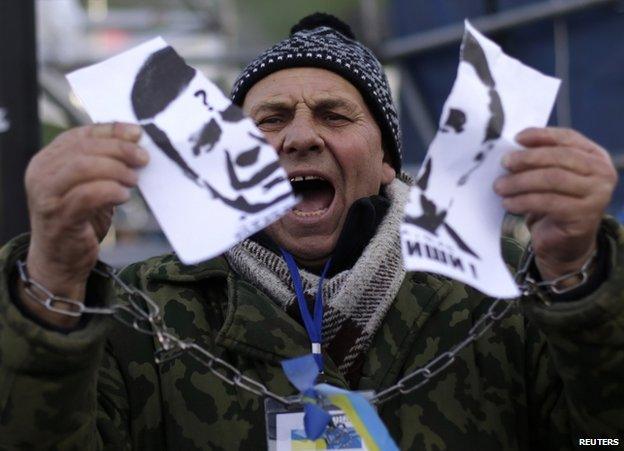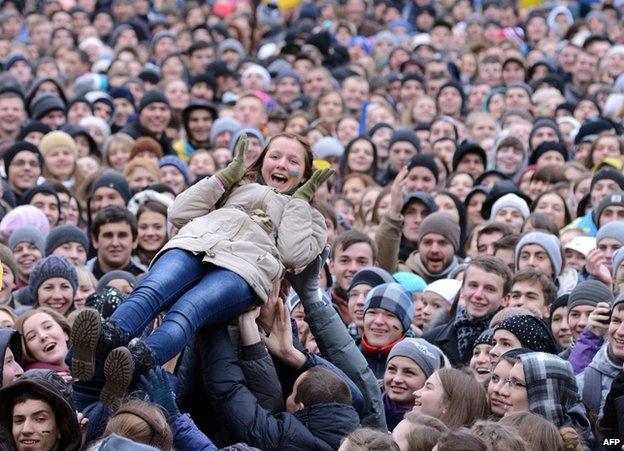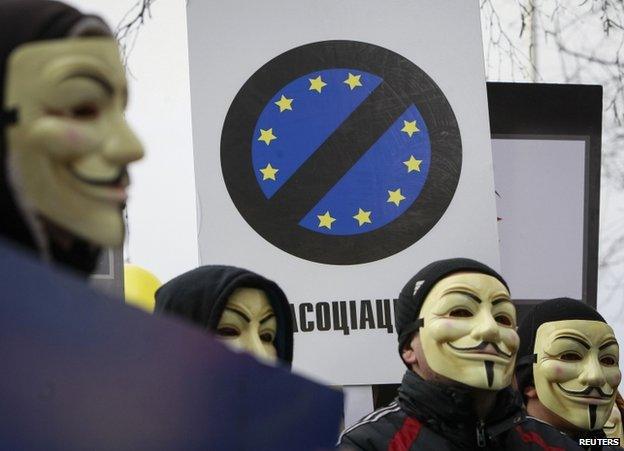EU summit shows no sign of reviving Ukraine deal
- Published
- comments
EU Council president Herman Van Rompuy: "There is no signature today"
European leaders appear to have made no progress on reviving a far-reaching association agreement with Ukraine at an EU summit in Vilnius.
Ukrainian President Viktor Yanukovych abruptly froze plans to sign the trade and reform deal last week, under pressure from Russia.
The Ukraine agreement, the summit's centrepiece, would have been a major step towards eventual integration.
But progress was made with two other ex-Soviet states, Georgia and Moldova.
Both initialled association agreements on Friday, the closing day of the summit, with diplomats hopeful that these can be signed next year.
Another ex-Soviet state, Azerbaijan, signed an agreement to simplify procedures for certain categories of visa.
Pro-EU protests are continuing in Ukrainian cities against the government's decision to back out of the agreement.
President Yanukovych defended his refusal to sign, by saying the EU was not offering adequate financial aid to upgrade Ukraine's economy.
But he said Ukraine was still committed to signing the association agreement "in the near future".
He also rejected an EU demand to free Yulia Tymoshenko, the imprisoned former Ukrainian prime minister and opposition leader.
In other summit business, UK Prime Minister David Cameron raised concerns about the free movement of people in the EU. Britain is planning to restrict access to welfare benefits for new immigrants, when labour restrictions are eased in January.
'Really close'
At a news conference on Friday, EU Council President Herman Van Rompuy said the parties were "really close" to signing the association agreement, but added: "We need to overcome pressure from abroad."
Speaking about Russia, European Commission President Jose Manuel Barroso said it was unacceptable to have "any third-party involvement" in a bilateral agreement negotiated between the EU and another state.

A protester in Kiev, with hands symbolically chained, ripped up a picture of Ukrainian President Viktor Yanukovych on Friday.

Pro-EU students turned out in the west Ukrainian city of Lviv on Thursday.

Anti-EU demonstrators also held a rally in Kiev on Thursday
French President Francois Hollande rejected the suggestion the EU should pay Ukraine compensation for upgrading its economy.
"We cannot, like the Ukrainian president would like it, insist on such equivalence, namely to insist that we pay Ukraine to get into an association agreement," he said. "No, we won't pay."
Like other EU leaders, he said the door remained open for Ukraine to sign the agreement at a later date.
EU leaders said in a statement, external earlier that they "strongly" disapproved of Moscow's pressure on Ukraine not to sign - while Russian President Vladimir Putin accused the EU of "blackmail".
Analysts say Russia worked hard to undermine the EU agreement with Ukraine, which it sees as a strategically vital partner.
On the one hand, it offered Kiev loans and price discounts. On the other, it threatened painful trade sanctions and higher gas bills.
'EU candy'
The two-day event, billed as the third Eastern Partnership Summit, external, is being held in the capital of Lithuania, which currently holds the rotating presidency of the EU.
The association agreement with Ukraine, external was aimed at promoting democratic values and economic co-operation.
EU Council president Herman Van Rompuy: "There is no signature today"
President Yanukovych told German Chancellor Angela Merkel late on Thursday that the economic situation in Ukraine was "very difficult".
"I have been one-on-one with Russia for three and a half years under very unequal conditions," he said.
In a Ukrainian TV interview earlier, he accused the EU of offering his country an inadequate amount in loans to help reform the economy.
The EU has offered to lend 610m euros (£510m; $828) in macro-financial assistance, provided that Ukraine continues to meet the conditions of an IMF stand-by loan of 11.15bn euros, agreed in 2010.
Mr Yanukovych said Ukraine would need at least 20bn euros a year, external to cover the costs of upgrading its economy to "European standards".
"For three years in succession they [EU leaders] have shown this candy in pretty wrapping to us," he added. "We don't have to be humiliated like this. We are a serious country, a European one."
Steve Rosenberg compares western and eastern Ukraine
Defending the EU's offer, EU Enlargement Commissioner Stefan Fuele said: "The Ukrainian economy needs huge investments but these are not costs. They represent future income, more growth, more jobs and more wealth.
"The only costs that I can see are the costs of inaction allowing more stagnation of the economy and risking the economic future and health of the country."
'European family'
Prominent Ukrainian opposition politician Vitali Klitschko, who is also in Vilnius, said he hoped the agreement would be signed after all.
"We Ukrainians want the changes," the world boxing champion added. "We want to live with the European family, with European rules, with Europeans' life standards."
The Ukrainian president has attacked EU demands to free Tymoshenko, saying: "What does the European Union have to do with this? Is the European Union a court?"
In a message from her prison cell in Kharkiv, Tymoshenko called on EU leaders not to let her continued imprisonment block the association agreement.
"If Yanukovych takes a positive decision, I sincerely ask you [EU country leaders] to sign the agreement without any preconditions, including my release," she said in the message, read out by her daughter Eugenia.
- Published28 November 2013
- Published27 November 2013
- Published10 December 2013
- Published27 November 2013